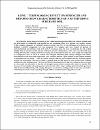| الملخص | The behaviour during long-term soaking of the California Bearing Ratio (CBR), the resilient modulus and the deformation of compacted Iraqi gypsiferous soil containing about 34% gypsum was studied. Sixteen (CBR) samples compacted at optimum moisture content and 95% of the maximum dry density of the modified AASHTO compaction test were prepared. Two samples each were soaked for periods of 0,4,7,15,30,60,120 and 180 days with 40 lb (178 N) surcharge load. The tests revealed that the soil swelled initially then it started to settle and the settlement process continued at a slow rate even after 180 days soaking. Directly after soaking and before carrying out the load-penetration test, each sample was subjected to a compressive wave as well as to a shear wave using the ultrasonic pulse velocity technique. The seismic determination of the shear and compression wave velocities allowed a good estimate of the resilient modulus of the gypsiferous soil tested. After the seismic test, the CBR test was completed and the TSS and gypsum content was determined. The tests revealed a marked drop in CBR and to a lesser extent in the resilient modulus MR with soaking period. The loss in CBR and MR took place at a high rate within the first week and at a decreased rate thereafter so that the soil strength became almost constant after about six months. The decrease of total soluble salts and gypsum content in soils with a longer soaking period is in full agreement with the loss in CBR and MR with soaking. The paper reveals that a soaking period of four days can lead to misleading and unsafe results regarding strength, stiffness and deformation of gypsiferous soils. |


